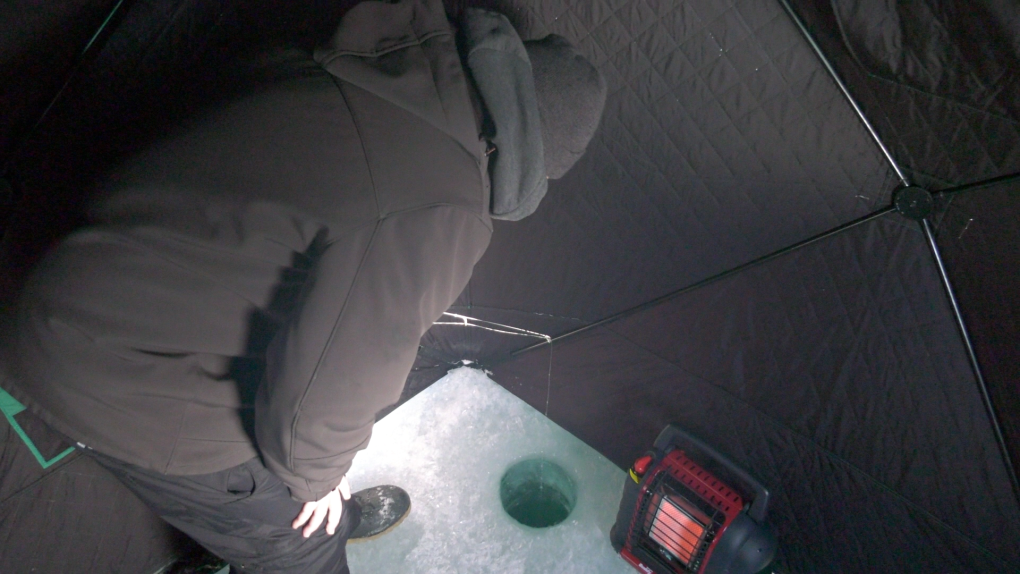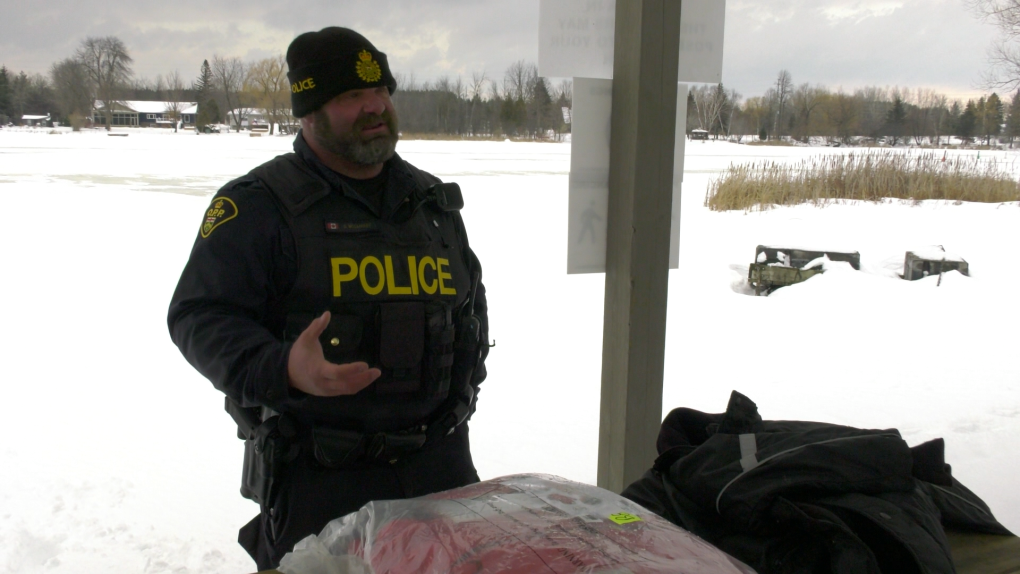Ice fishing an inexpensive winter hobby, but ice safety is key
On one of the coldest days along the St. Lawrence River in Cardinal, Ont., Dan Delorme and his brother-in-law Jamie Day are setting up their ice fishing hut on the Gallop Canal.
"I've fished here pretty much here my whole life and caught many kinds of fish and it's just a good way to get out," said Day. "Whether on a boat or on the ice, it's just good times."
In the thick of winter, ice fishing is a hobby that's not too expensive for beginners to break into.
"We were here about two weeks ago, and we had a tip up and two fishing rods setup," said Delorme. "I had an $8 spool of line with a $0.60 hook and a weight and it was attached to a stick. We caught all our fish on that stick that day."
"People have been fishing for thousands of years, the concept hasn't changed, you know," he added. "People are still fishing hook line and sinker. You can go from the extremely cheap to ridiculously expensive or anywhere in between."
 Jamie Day fishes inside a hut on the St. Lawrence River in Cardinal, Ont. on Saturday. (Nate Vandermeer/CTV News Ottawa)
Jamie Day fishes inside a hut on the St. Lawrence River in Cardinal, Ont. on Saturday. (Nate Vandermeer/CTV News Ottawa)
The recent cold snap provided about eight inches of ice where they set up for the day, using a propane heater inside an insulated hut to keep them cozy.
"Technology just makes it that much more comfortable now," Delorme said. "Everything is just a little bit easier than it was 15 years ago."
"Twenty years ago I'd be sitting on a bucket out in -20 in the wind," he said with a laugh.
While the cost of the hut and heater can range about $500, aside from a couple fishing rods, an auger and bait, you can be ready to fish.
"For me, it's made a huge difference," Delorme said. "The fact that i can go out and sit there for eight hours and enjoy my day and not have to worry about being out in the elements, it just makes my day that much more better."
 OPP Const. Sean McCaffrey of the OPP S.A.V.E. Unit discusses ice safety in Merrickville, Ont. (Nate Vandermeer/CTV News Ottawa)
OPP Const. Sean McCaffrey of the OPP S.A.V.E. Unit discusses ice safety in Merrickville, Ont. (Nate Vandermeer/CTV News Ottawa)
However, even on a bone chilling day with temperature feeling like -30, ice safety should always be a key priority for anyone heading out onto the ice.
"First of all, I have to say that no ice is safe ice, but there are general guidelines out there," said Const. Sean McCaffrey with the Ontario Provincial Police Snowmobile, ATV, Vessel Enforcement Unit (S.A.V.E.)
"The Ministry of Natural Resources suggest that four inches is your minimum for ice fishing," he added. "And if you're going, we do recommend that you do take some safety precautions, highly recommended is a survival or floatation suit of some sort, something that will help you float if you fall through."
McCaffrey noted other items to pack include a compass, waterproof flashlight and matches and a change of clothes.
"We always recommend going with a buddy. If you are going out on the ice, tell someone where you are going, when you'll be back, what to do in case you don't return," McCaffrey said.
"The biggest thing is try to find out how much ice is out there," he added. "Talk to the local fishermen, know before you go, and again I go back to no ice is safe ice."
"Unless you physically look at the ice yourself, you drill through, then you know that one spot is good," he said. "Ten feet away, depending on current, wind, snow cover, it could be two inches, there is so many variables."
The recent snowfall can also act like an insulator, keeping sections of ice at varying levels of thickness.
"Every year, unfortunately, there's several people that do go through and we do our best to help them," he said.
"Overall, it's generally a safe sport if you know what you're doing and you are prepared, but if you're not prepared or if you don't know what you are doing, you can easily get into trouble," McCaffrey said.
Delorme says even with four inches of ice, he waits for it to be thicker before heading out onto any body of water.
"I usually wait to see people out on the ice and know it's safe and then I'll go out and once I cut my hole. I'll see exactly what's there," he said. "Then I'll know what I have."
"If you can find the ice and you can get out on the St. Lawrence, you can do fairly well," he added. "This is our third time out this year and last time we were out we got two pike a couple small perch."
Delorme says to make sure you have an updated fishing licence as well when doing any sort of fishing.
"We go every chance we can get now and this year we're going to start looking for spots we've never been to. That's part of the adventure," he said.
While it was a slow morning with just a couple of bites, both men say that's how the hobby goes.
"It's just another option to get outside in the winter," Delorme said. "Even when it's -30!"
CTVNews.ca Top Stories

Canada could impose tariffs on U.S. steel, orange juice in response to Trump threat
Canadian officials are narrowing a list of American products to target in the event the federal government must respond to U.S. tariffs on Canadian goods, CTV News has confirmed.
Convicted Jan. 6 rioter arrested as fugitive in Whistler, B.C.
An American citizen convicted of participating in the Jan. 6, 2021, riot on Capitol Hill who said he was seeking asylum in Canada has been arrested as a "fugitive from U.S. justice," according to authorities.
Can the U.S. really make Canada the 51st state?
Talk of Canada becoming the 51st American state has raised an existential question on this side of the border: Could it be done? Could the maple leaf make way to the stars and stripes? According to several experts, it may be possible, but not painless.
L.A. wildfires continue to devastate area, Canada prepared to offer expertise
A series of wildfires are searing through the Los Angeles area, forcing many to evacuate their homes. Here's everything that happened throughout Jan. 8.
'True when I said it, true today': former Canadian PM Harper pushes back against Trump on social media
Former Canadian Prime Minister Stephen Harper doesn’t find president-elect Donald Trump’s jibes about Canada becoming the 51st U.S. state very amusing.
Ontario Premier Doug Ford says he is 'OK' after OPP vehicle he was in was 'sideswiped' in Highway 401 collision
Ontario Premier Doug Ford was uninjured after an OPP vehicle he was travelling in was involved in a collision on Highway 401 earlier today.
At least 60 University of Guelph students sick as 'cluster of illness' hits residence
The University of Guelph is dealing with what they are calling a ‘cluster of illness’ among students living in residence.
Energy minister 'committed' to consumer carbon tax as he considers Liberal leadership
Energy and Natural Resources Minister Jonathan Wilkinson says he would be 'committed' to the consumer carbon tax should he become Liberal leader and prime minister, despite the policy’s unpopularity.
New ranking suggests Canada passport among 'top 5 losers' in the world
A new global ranking may raise doubts about Canada's reputation of being open to other countries.































